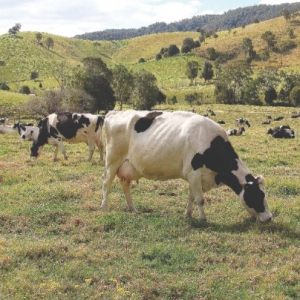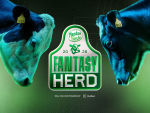OFF-PEAK MILK production doesn’t necessarily mean intensive feeding, says a new study from Dairy Australia.
An analysis of Victorian dairy industry trends from 2006 to 2012 shows a clear shift towards off-peak milk production for six years. Many Victorian farms have increased off-peak production by intensive feeding, yet many have done so by maintaining 50%, or higher, grazed pasture.
Dairy Australia’s farm business management programme manager, Gavin McClay, says the analysis explored the relationships between operating costs and margin and the level of off-peak milk produced. “There was no significant correlation between operating cost and off-peak milk production, nor was there correlation between operating margin and off-peak milk production.”
The report showed farm operating cost falls and operating margins increase as the proportion of grazed pasture increases. Farms with more than 55% directly grazed pasture were more profitable and resilient through the last six years; farms with high feed inputs, lower levels of direct grazed pasture and flat milk supply patterns have the greatest amount of risk.
The study showed that a range of systems can be profitable but farmers need to be aware these different systems have different risk profiles which need to be considered for their situation, says McClay.
Dairy Australia commissioned the report in response to interest by Victorian dairy farmers and key industry stakeholders in the impact of changes to milk supply patterns, farm profitability and risk. It analysed participants in the Victorian Dairy Industry Farm Monitor Project from 2006 to 2012.
The impacts on cost of production and farm profit margins across a range of milk supply patterns from seasonal to all year-round were analysed.
Other key findings from the analysis included:
• In 2006-07, 50 % of farms in the sample produced off-peak milk (at least 40% of their milk supply from February to July).This increased to 76% of farms in 2009/10 and has remained stable since.
• Increasing off-peak milk production does not guarantee a flat milk supply curve, but there is a correlation between off-peak milk and increased plant utilisation.
• Medium to large farms have shifted markedly from a seasonal supply pattern towards a flatter milk supply curve.
• Farms producing less than 120,000kgMS risk higher cost of capital, higher labour and overhead costs and attract a lower milk price.
• Milk pricing systems driving increased off-peak percentage and higher plant utilisation but with a ‘stepped’ structure can reduce the flexibility of farmers to respond appropriately to seasonal conditions.
Dairy Australia plans similar supply trends analyses in NSW and Queensland.


















